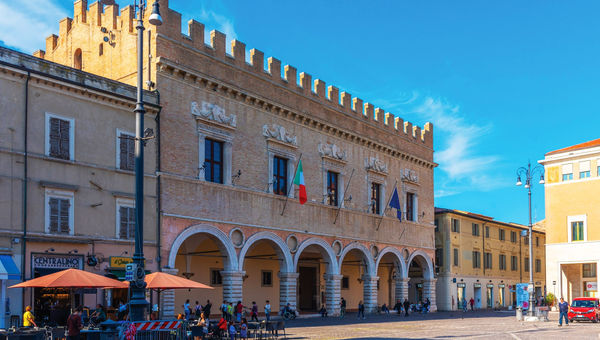Every year an Italian town or city is named the Italian Capital of Culture, elevating its profile and attracting visitors from far and wide. This year the chosen one is Pesaro on the Adriatic coast.
Visitors quickly discover, as so often happens in Italy, that this is much more than just a charming resort town and offers a spectacular assortment of experiences. Packed with history, art and music, it has beautiful beaches, great food and a laid-back, unhurried lifestyle. Locals get around on bicycles.
The city is located in the province of Pesaro and Urbino (more about that little gem of a town later) in Italy's central Marche region.
Pesaro is just 35 miles from two international airports: Rimini's Federico Fellini and Ancona's Raffaello Sanzio, which is named after Raphael, the 15th-century master who was born in Urbino. Well served by motorways and high-speed trains, it is only four hours by car from Rome and Milan and is the birthplace of the famous opera composer Gioacchino Rossini, whose house is now a small museum.
Sharing the wealth
The yearlong Capital of Culture program of events, exhibitions, performances, fun and visitor attractions caters to all tastes and budgets. And it extends well beyond Pesaro itself, because mayor Matteo Ricci had the breakthrough idea of bringing 50 provincial towns and villages in on the act, inviting each to be co-capital of culture for a week. And big or small, they have come up with a dazzling assortment of authentic visitor experiences.
Pesaro's Rossini Opera Festival in August draws international audiences with its world-class artists. The seafront will sparkle on Aug. 10 for the Night of the Candles dinner with a all-white dress code. There are weekly historical guided tours of famous monuments and concerts from the balcony of Rossini House.
In September, there's a vintage car rally and a Benelli Week with motorbike tours of Pesaro. There are also street markets, arts festivals, wine and food tastings, sporting events, fairs and more throughout the province. Many are free and are a great way to unearth the hidden surprises and thrills of the Marche region.
Filippo Galeazzi, Pesaro 2024's communications director, said noteworthy events in smaller centers include the July Notti di Lavinia in the magnificent Montebello Castle with concerts and a historical re-enactment in period costumes with a Renaissance banquet.
Mondolfo will hold a mid-August accordion festival with alfresco performances and an exhibition. In Acqualagna, which is Italy's truffle capital, the prized white fungi will reign supreme during the town's week as co-capital of culture, which coincides with the White Truffle Festival week from Oct. 28 to Nov. 3.

The 15th-century Palazzo Ducale in the center of Pesaro. Photo Credit: trabantos/Shutterstock.com
Beaches and boutique hotels
Pesaro's five miles of sandy beaches have lidos, family-friendly waters, sailing and windsurfing. The city also has cycling and trekking trails and nearby world-class golf courses.
The old center has elegant buildings and stylish boutiques, and the family-run hotels are famous for their welcome and their home cooking. Some also have pools, like the boutique, five-star Excelsior Hotel, which offers restaurant service on its private beach and has a day spa. The four-star Hotel Villa Catani Stuart is an elegant 17th-century mansion two miles from the sea with a large pool, a hot tub and complimentary bicycles.
The food, from street stalls to Michelin-starred, is Italian cuisine at its best.
The Nostrano restaurant, next to one of Arnaldo Pomodoro's massive bronze spheres -- which is the city's landmark -- has one Michelin star, contemporary interiors and imaginative surf and turf dishes. The 184 types of pizza (yes, 184) at C'era Una Volta are reason enough to try this local favorite. It also serves the famous Pizza Rossini, which it says can only be found in Pesaro; it comes with the unusual toppings of hard-boiled eggs and mayonnaise and is a must-try.
On to Urbino
Then there is Urbino. This ancient hilltop town, which became a single province with Pesaro in 1860, is compact enough to walk around in a morning and has a wealth of heritage and beauty packed along its cobbled streets.
Where to start? Urbino's tourism councilor, Roberto Cioffi, recommends visitors begin at the Unesco-listed Ducal Palace, a magnificent Renaissance monument that houses a gallery of great art. He also advises a visit to the house where Raphael was born, which now serves as a museum.
For lunch or dinner in Urbino, Cioffi said, it's a toss-up between the Portanova, Ponente and La Stella restaurants for genuine local specialties and their attention to organic products, for which he says the Marche region is a trendsetter.